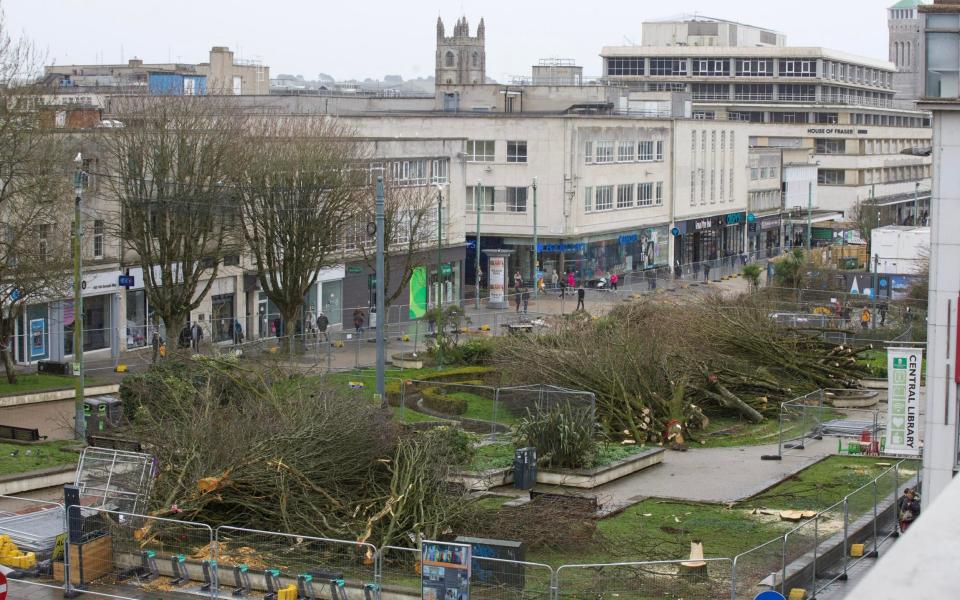Plymouth trees saved for now in High Court battle

The trees at the centre of a bitter row in Plymouth have been given a temporary reprieve by the High Court on Friday.
Cheers went up among campaigners in the city centre as the judge said a midnight injunction that saved 16 trees moments before they were to face the council’s axe last week would stay in place.
The trees will be safe at least until the conclusion of a judicial review into the council’s decision-making, which could take three to four months.
The injunction, brought by campaigners, came too late to save 110 trees that were cut down by Plymouth City Council in a dramatic night time operation branded “environmental vandalism”.
The felling began last Tuesday evening, moments after council leader Richard Bingley used executive powers to sign off on the operation in the city’s Armada Way.
Cllr Bingley has since resigned, but on Friday told Telegraph he had “no regrets” about his decision, arguing that the area where the trees stood was an “unsafe dump”.
A serious issue
In a hearing on Friday, Ross Cranston, the High Court judge, said there was a “serious issue to be tried” over the council’s use of emergency powers.
Making his decision, he said of the trees that “once they are gone they are gone”.

Lawyers for the council had argued that the operation was “not tree wrecking; it is cutting down the wrong tree in the wrong place” and said the urgency was required before the run-up to local elections in May.
The judge ruled that the remaining branches and stumps from the 110 trees that were cut down in the night-time operation could be cleared by the council once they carried out an ecological assessment.
The injunction will stay in place until the conclusion of a judicial review, brought by campaign group Save The Trees of Armada Way (Straw), which will interrogate the council’s decision-making.
Council's chainsaws
Ali White, who has led the campaign for Straw, on Friday celebrated that the trees would be safe from the council’s “chainsaws”.
“The decision by Plymouth City Council to come to court today to try and overturn our injunction despite almost universal condemnation of their actions last week is staggering and gives you an indication of what we have been up against these last six months,” she said outside the Royal Courts of Justice in London on Friday.

“The decision to completely destroy our urban forest against overwhelming public opposition in a way that avoided public scrutiny is indefensible.”
The council had hoped to push ahead with their plan to clear the remaining trees to make way for a £12.6 million redevelopment.
In Plymouth, campaigners had gathered at Armada Way on Friday afternoon awaiting the verdict on plastic chairs decorated with ribbons and knitted banners.
They erupted in a cheer when they got the news that, for now, the remaining trees would be saved. It had been an emotional campaign, with many giving time and money to save the trees they'd grown up around.

Lesley Park, whose cafe Oggy Oggy overlooks the site where the trees were felled, said her view has been “devastated” and that they've lost business since the trees were cut down.
“I cannot believe the city council did it in the dark of the night,” she said.
“It’s ruined the view, we had to fight to be able to put our tables outside again. We lost business in the last two weeks.”
Cllr Bingley, who was facing a vote of no confidence next Monday before his decision to step down, defended his actions to the Telegraph on Friday.
“I have no regrets whatsoever about implementing this plan which will transform an area of our city that was and is an unsafe dump,” he said.
“Our improvement plan is tremendous, exactly what our blighted city centre needs.
“My own take on this, is that [the] council's revised Armada Way transformation plan - rich in tree-lines and fauna - is both beautiful and belated.”
Cllr Bingley claimed that due to “haphazard tree cover, poor CCTV penetration and the area’s general emptiness and eeriness”, the city centre was unsafe for women and girls.
He also said that the proposed development would reduce the threat and risk to Plymouth’s “most vulnerable citizens and visitors”.
He added: “In a couple of years, maybe sooner, should the courts allow, Armada Way will be an urban space that we can all be so very proud of, and pleased to spend time in.”
Several other councils have faced similar debate over plans to remove trees in recent months.
In Cambridge, hundreds of trees are expected to be felled to make way for a new bus route, while in Wellingborough campaigners last month climbed trees in an attempt to save dozens from being removed for a dual carriageway.
Earlier in March, an independent inquiry into a major tree felling operation in Sheffield criticised the city council’s ‘dishonest behaviour’.

 Yahoo News
Yahoo News 
